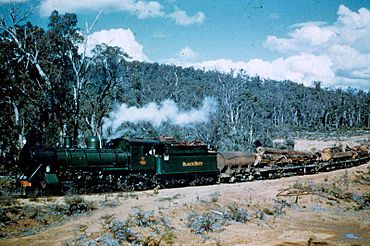Banksiadale, Western Australia facts for kids
Quick facts for kids BanksiadaleWestern Australia |
|||||||||||||||
|---|---|---|---|---|---|---|---|---|---|---|---|---|---|---|---|

A Banksiadale log train, ca. 1960.
|
|||||||||||||||
| Established | 1910 | ||||||||||||||
| Postcode(s) | 6213 | ||||||||||||||
| Area | [convert: needs a number] | ||||||||||||||
| Location |
|
||||||||||||||
| LGA(s) | Shire of Murray | ||||||||||||||
| State electorate(s) | Murray-Wellington | ||||||||||||||
| Federal Division(s) | Canning | ||||||||||||||
|
|||||||||||||||
Banksiadale is a place in the Peel region of Western Australia. It is located north of Dwellingup. The local government area for Banksiadale is the Shire of Murray.
Banksiadale used to be a busy town. It was once a hub for the timber industry.
Contents
History of Banksiadale
Banksiadale gets its name from the Banksia plant. The area has many jarrah trees. It also has a lot of Banksia grandis plants. These are also known as Bull Banksia. For over 50 years, Banksiadale was a small town. It was important for milling timber.
Timber and Railways
The Hotham Valley railway line opened in 1910. It connected Pinjarra to Dwellingup. This railway helped transport timber. The timber came from jarrah and marri trees.
In 1911, a spot was chosen for a new timber mill. This mill would produce wood for railway needs. A railway line to this spot opened in January 1912. The No. 2 Railway Mill was built that same year. It started working in December 1912.
By 1917, a network of railways grew. These tracks stretched for 33 kilometres. They connected Banksiadale to the areas where trees were cut down. In 1926 alone, the Banksiadale mill produced a lot of timber. It made 185,000 railway sleepers. Sleepers are the wooden beams that support railway tracks. It also produced 6,347 other loads of timber. The railway company used about half of this wood. The rest was sold or stored.
New Timber Sources
By 1946, the local timber was running out. So, the railway company found a new timber source. This was the Asquith Block. It was about 30 kilometres east of Harvey. A railway line from Asquith Block was finished in 1948. This line included a long timber bridge. This bridge is now considered a heritage site.
In the early 1950s, logs from Asquith Block came to Banksiadale. They were pulled by G class locomotives. Locomotives are powerful train engines. Later, more modern Cs class locomotives were used. The sawn timber was then sent back to Dwellingup.
Fires and the End of the Mill
In January and February 1961, big bushfires hit the area. These were the Dwellingup fires. They caused a lot of damage to the countryside. However, the Banksiadale town and timber mill were not harmed.
Sadly, the mill itself burned down in 1963. It was not rebuilt. This was because the land was planned to be flooded. This flooding would happen when the South Dandalup Dam was built. Many of the mill houses were moved to Dwellingup. Private homes were sold and taken down. The railway tracks were also removed later. Even after this, special trains brought visitors to the area in the 1960s.
Banksiadale Today
Today, the main feature of Banksiadale is Lake Banksiadale. This lake was formed by the South Dandalup Dam. Most of the area is now a special zone. This is to protect against a plant disease. The disease is called Phytophthora cinnamomi dieback.
 | Stephanie Wilson |
 | Charles Bolden |
 | Ronald McNair |
 | Frederick D. Gregory |

